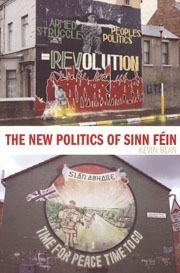Book contents
- Frontmatter
- Contents
- Acknowledgements
- List of Abbreviations
- Introduction
- Part I Defining the Community
- Part II The Historic Compromise?
- Introduction to Part II
- 4 The Ideological Origins of New Sinn Féin
- 5 On the Long Road: The Provisional Politics of Transition
- 6 The Historic Compromise?
- Conclusion: The End of a Song?
- Bibliography
- Index
5 - On the Long Road: The Provisional Politics of Transition
from Part II - The Historic Compromise?
- Frontmatter
- Contents
- Acknowledgements
- List of Abbreviations
- Introduction
- Part I Defining the Community
- Part II The Historic Compromise?
- Introduction to Part II
- 4 The Ideological Origins of New Sinn Féin
- 5 On the Long Road: The Provisional Politics of Transition
- 6 The Historic Compromise?
- Conclusion: The End of a Song?
- Bibliography
- Index
Summary
The only objective I ever heard in the early days was to get the Brits out of Ireland … through armed resistance, engage them in armed conflict and send them back across the water with their tanks and guns. That was the Republican objective.
We have seen the tentative beginnings of a real process of national reconciliation between Orange and Green. The prospect of a peaceful transition to Irish unity has never been closer.
Denying the existence of the country in which they hold office
In the early days of the devolved executive, one of the new Sinn Féin ministers, Conor Murphy, reportedly issued guidance to his civil service staff to ‘use language he was comfortable with’ in speeches and statements issued in his name. In particular, staff were asked to refer to Northern Ireland as ‘here’ or ‘the North’, and the Irish Republic as ‘all-Ireland’. The resulting political row was predictable, and echoed the familiar controversies surrounding place-names and titles that had long been a feature of public life in the region.
While some found amusement in the minister's attempts to redefine the region's constitutional status through place-names, one Unionist response to the memo unwittingly made a telling assessment of the New Sinn Féin project. In suggesting that ‘Mr Murphy appeared to be trying to deny the existence of the country in which he holds office’, the DUP MP Gregory Campbell pointed to a central contradiction within Provisional strategy.
- Type
- Chapter
- Information
- The New Politics of Sinn Fein , pp. 174 - 216Publisher: Liverpool University PressPrint publication year: 2007



